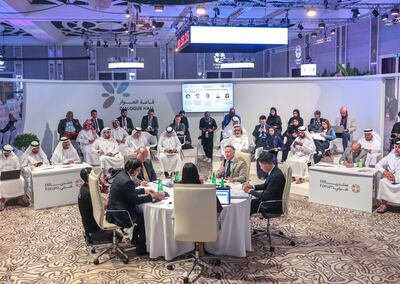The US-China competition over technology is creating a seismic shift in global power dynamics, leaving emerging tech powers such as the UAE and India with important choices as they navigate this new terrain, experts at an Abu Dhabi forum said.
Brendon J Cannon, assistant professor of international security at Khalifa University in Abu Dhabi, said countries could take advantage of the current geopolitical landscape and engage with tech leaders to boost their national capabilities.
He was speaking on the ‘US-China Competition: Implications for Emerging Tech Powers’ panel at the Hili Forum in Abu Dhabi on Tuesday.
“One of the most exciting things we see is countries, like the UAE, who are purportedly in the middle of this high polarity, great power rivalry, and I think there's a lot of opportunity spaces for states, especially with capabilities and human capital like the UAE has,” he said.
“Or, let me put it this way, there's an opportunity to engage with the best tech leaders out there right now.
“There's an appetite, not only on the part of states like the UAE, but there’s also an appetite on the part of United States, China and South Korea and other major tech powers to engage as well.”

The UAE has maintained strong economic and diplomatic ties with various powers, allowing it to attract investments and expand trade partnerships with both nations.
As a result, the Emirates has positioned itself as a global hub for innovation and commerce, leveraging its connections with two of the world’s largest economies to drive domestic growth.
Dr Tingyi Wang, a research fellow at the Anwar Gargash Diplomatic Academy, said that the UAE could be a bridge between the East and the West.
“Ten or 15 years ago, a forum like this one was probably [hosted] in Berlin and probably in Washington DC,” he said.
“Now, it's very difficult. It's very difficult to bring East and Eest scholars and senior members together, except in these emerging places.
“So, in one way, I think that they could bring these talents and both sides of the technologies here, and also can create platforms for these people to talk about it. I think this is incredible.”
Tense relations
US-China relations have become increasingly strained due to economic, technological and security tensions, with the US imposing trade sanctions and export restrictions on key Chinese industries, particularly in the tech sector.
The US has targeted China's access to advanced technologies like semiconductor chips, which power nearly all modern technology, from smartphones and computers to advanced military systems and artificial intelligence. These chips were invented in the US, and are now also manufactured by South Korea, Japan and Taiwan.


